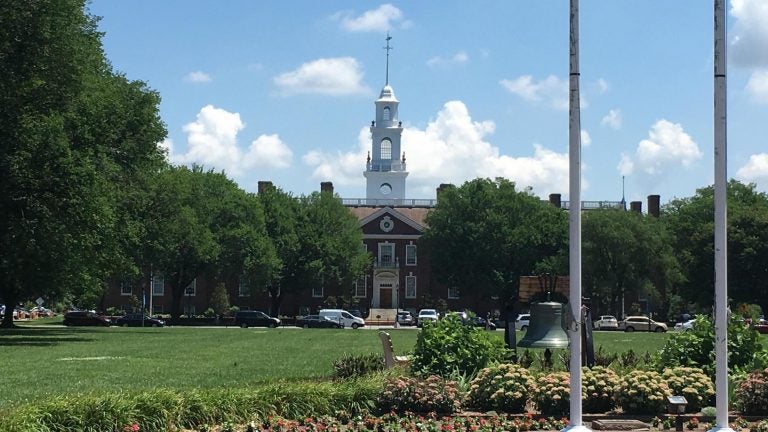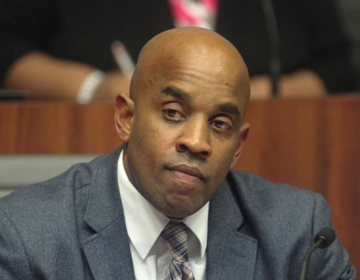‘They don’t want to go to the polls’: Delaware lawmakers on verge of approving vote-by-mail system
A similar system was used without major issues during the 2020 election as an emergency measure. Now lawmakers are poised to make voting by mail the law.
Listen 1:21
The Delaware State House in Dover. (Tom Byrne/Delaware Public Media)
Two years ago, when the coronavirus pandemic was first racing through the population and residents were under restrictions on gatherings, Delaware lawmakers approved voting by mail as an emergency measure.
The measure survived a lawsuit by the state Republican party, and led to 160,000 residents casting their ballots by mail. That’s nearly one in three of the 500,000 Delawareans who voted in the 2020 election. No serious issues were reported with that process.
Even though all COVID-19 restrictions have been lifted, lawmakers now want to enshrine the practice into the law.
The state Senate approved the vote by mail measure this month in a 13-8 vote along party lines. Only one Democrat dissented. Sponsor Kyle Evans Gay was able to vanquish all but one of a whopping 27 amendments proposed by staunch GOP foe Colin Bonini, who attempted to stall and derail the bill with a makeshift filibuster when the Senate voted on it June 16.
The bill is scheduled for a vote Tuesday in the House, where 22 Democrats — a majority of the 41 members — are sponsors. Gov. John Carney supports it too.
There’s three more legislative days left in the session before lawmakers adjourn on Thursday. But Sen. Gay, a Democrat who represents the suburban Brandywine Hundred area north of Wilmington, says that with the number of sponsors surpassing “the majority needed to pass the House’’ she’s guardedly optimistic it will become law so the practice can be employed for Delaware’s September primaries and November general election in Delaware.
“I’ve had great conversations with my colleagues and I think everyone realizes how important voting access is,’’ Gay said.
‘Similar system free of fraud or insecurity in the 2020 election’
To vote by mail, the resident must request the mail-in ballot — unlike in the 2020 pandemic-plagued election, when the state sent registered voters a mail-in packet. The request can be made in writing and mailed or hand-delivered to elections officials, or submitted electronically.
The ballot must be mailed to the voter no earlier than 30 days before the election, and no later than seven days beforehand.
When filling out the ballot, voters would have to include their name, county of residence, address, election district, representative district and “solemnly swear” that they are eligible to vote.
Vote by mail would not be available for presidential primary elections or school board elections.
The state Department of Elections estimates that 10,000 ballots could be used in primary elections, and 25,000 for general elections. The cost would be about $3 per ballot plus about $25,000 a year for equipment and staff to collect and tabulate the mail-in ballots.
“In Delaware, we know that it is doable. We know how much it costs. And we know that we were able to execute a similar system free of fraud or insecurity in the 2020 election,’’ Gay said.
“So I think it’s a positive move for Delawareans. When we enable individuals to request the mail ballot if they so choose, it’s a way for any number of Delawareans who may face challenges reaching the polls on Election Day, an opportunity to participate fully in our democracy.”
In addition, voting by filing out paperwork and sticking an envelope in the mail simply makes sense “in a world where we can do so many things by mail, so many things electronically,’’ Gay said. “If we can do this safely and securely, we should open access for Delawareans.”
Jill Itkowitz of the League of Women Voters of Delaware agrees and is confident the House can hold the committee hearing and pass the bill next week.
Noting that 43% of Americans voted by mail in the 2020 presidential election, Itkowitz said it’s a popular option among the public.
“It’ll make voters able to avoid long lines and they won’t have to take time off of work,’’ Itkowitz said. “And it’ll make voting accessible to people that have problems such as working families and students.”
Itkowitz said her organization has received “many many emails and phone calls, emotional phone calls from older voters remained concerned about COVID health risks. And they might have some impairment. And they’re upset. They don’t want to go to the polls.”
Foe: ‘Doesn’t take a lot of fraud to affect elections’
That sentiment hasn’t stemmed GOP opposition, No Republicans voted for it in the Delaware Senate, and none are House sponsors.
“I have tremendous concerns about vote-by-mail’’ without any restrictions,” Bonini said, adding that he didn’t object to absentee voting for military members and others with legitimate reasons such as a disability or being out of town on election day.
“But I think in a small voter universe such as Delaware, it doesn’t take a lot of fraud to affect elections.”
He said some legislative districts have only a few thousand votes cast in primaries or general elections. Turnout can be even smaller in municipal elections. For example, in Wilmington’s Fifth Councilmanic district in 2020, the margin of victory was 21 votes out of 1,211 cast. A total of 364, or 30% of the votes, were cast by mail.
So Bonini decided to derail the bill by basically trying to bring the Senate to a halt on June 26. First he introduced dozens of amendments to the vote-by-mail legislation, many consisting of a few words to delay implementation for months or years.
Before the bill even was ready for consideration, though, the Dover-area lawmaker spent the better part of an hour calling for roll votes on whether other bills should be considered, delayed, tabled and more. Sen. Majority Leader Bryan Townsend objected to what he called a violation of “Senate norms” but Bonini persisted.
But after the body broke for party caucus, Gay worked out a deal with Bonini to withdraw all but one amendment. That would require those using vote by mail to include the last four digits of their Social Security number or driver’s license with their paperwork. And the Senate approved it overwhelmingly.
“It is pretty common sense, right?” Bonini said. “We need to verify as best we can that the person filling out the ballot is the voter.”
Gay said the approval of that amendment is part of the legislative process,which she views “as a collaborate effort.”
Sen. Townsend says the bottom line is that the bill as it’s currently written is a solid one that will help thousands of voters.
“Is there a good reason not to do it? And the answer, we believe, is no,’’ Townsend said. “There’s no good reason not to have this be one of the tools in the toolbox of democracy for people to be able to exercise their right to vote.”
WHYY is your source for fact-based, in-depth journalism and information. As a nonprofit organization, we rely on financial support from readers like you. Please give today.








